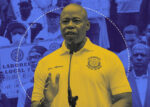There’s always a bigger fish.
Gregg Winter’s W Financial is facing an unenviable opponent in its quest to boot a commercial tenant from a lucrative development site on the Upper East Side.
JPMorgan Chase has sued the Great Neck bridge lender to stop it from terminating the lease at 1135 Lexington Avenue, on the northeast corner of East 79th Street, where the banking giant took over a First Republic branch after buying the failed bank’s assets in May.
The lawsuit responds to an 11th-hour legal gambit by W Financial in which the lender tried to push out First Republic in the final, frenzied days of the bank’s existence, FedExing it a list of supposed lease violations ranging from a too-narrow elevator door to overcrowded toilets.
“Given a development opportunity, a commercial landlord may try to find a creative way out of a lease,” said Jennifer Recine, a real estate attorney at Kasowitz Benson Torres, “especially if they believe the commercial tenant has fewer resources to defend itself.”
First Republic was on the ropes when it received W Financial’s list of items to cure, but JPMorgan has the resources to outlast almost any litigant. The bank has asked a judge for a Yellowstone injunction, a common legal protection afforded to New York commercial tenants when they can cure alleged defaults.
W Financial took ownership of the coveted Upper East Side assemblage in February through a foreclosure sale following the monetary default of the prior owner, failed developer HFZ. When a run on First Republic’s deposits caused panic the following month, W Financial seized the moment, perhaps not expecting that the world’s largest bank would pick up the gauntlet.
The bank “disputes the list of defaults alleged” by W Financial but is “willing and able to cure any such defaults without vacating,” according to an affidavit from JPMorgan real estate executive John McGinley. JPMorgan’s attorney on the case, Daniel Ansell, co-chair of real estate litigation at GreenbergTraurig, declined to comment further.
First Republic had called the supposed violations a “thinly veiled” and “bad faith” effort to terminate the bank’s rights under its lease, and blamed W Financial’s building inspectors for overcrowding the building’s basement restrooms during an inspection. Details of the lender’s legal gambit were revealed for the first time by JPMorgan’s lawsuit.
Removing the commercial tenant from 1135 could help W Financial unlock the development site at the corner of East 79th Street and Lexington Avenue, and possibly allow the lender to flip the site, with 57,000 square feet of residential development as-of-right, for more than what it paid.
The site could be enlarged by buying properties moving south down Lexington Avenue, which W Financial as well as Macklowe Properties have attempted to do, but to no avail.
JPMorgan’s opposition to leaving the space might undo any optimism at W Financial created by First Republic’s financial problems. A reading of the lease agreement, which JPMorgan inherited from the failed bank, suggests that it has the right to renew the lease through 2036.
Should JPMorgan decide to wind down what were First Republic’s operations (there is no shortage of Chase branches in the area), it could potentially leverage the value of the branch site, including some 12,000 square feet of air rights, in the process of exiting the lease.
In New York, Los Angeles and San Francisco, the banking giant now holds more than 656,000 square feet of First Republic leases across five buildings owned by Tishman Speyer, KKR, 601W Companies and CommonWealth Partners. It announced it will spend $2 billion this year to “restructure” the bank, which could include paying lease-termination fees.
The bank’s second-quarter profits lept 67 percent, partly on the back of its deal for First Republic, with its income from interest six percentage points higher than without the acquisition, according to reports of the bank’s financial records.
CEO Jamie Dimon has struck a cautious tone about whether the US economy will achieve a “soft landing” to avoid recession amid rising interest rates and persistent inflation.
Some real estate observers wondered if W Financial’s tactics could become more common as commercial landlords repurpose their property to cope with changes brought on by Covid.
Read more



